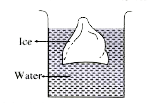A body floats on water and then also on an oil of densily 1.25. Which of the following is/are true?
The body loses more weight in oil than in water.
The volume of water displaced is 1.25 times that of oil diplaced
The body experiences equal upthrust form water and oil.
Apparent weight is zero in both cases.
The correct Answer is:B, C, D
V1×dwg=V2×doilg=W
⇒V1×1=V2×1.25⇒V1=1.25V2
V1= Volume of water displaced.
Since the body floats in both the liquids, so in both the cases Buoyancy=Weight
Entire weight is lost, the apparent weight is zero in the both cases.
Also, Upthrust=Buoyancy
Topper's Solved these Questions
- MISCELLANEOUS VOLUME 2Book:CENGAGE PHYSICSChapter:MISCELLANEOUS VOLUME 2Exercise:LC_TYPE
Explore 34 Videos
- MISCELLANEOUS VOLUME 2Book:CENGAGE PHYSICSChapter:MISCELLANEOUS VOLUME 2Exercise:INTEGER_TYPE
Explore 10 Videos
- MISCELLANEOUS VOLUME 2Book:CENGAGE PHYSICSChapter:MISCELLANEOUS VOLUME 2Exercise:INTEGER_TYPE
Explore 10 Videos
- MISCELLANEOUS KINEMATICSBook:CENGAGE PHYSICSChapter:MISCELLANEOUS KINEMATICSExercise:Interger type
Explore 3 Videos
- NEWTON'S LAWS OF MOTION 1Book:CENGAGE PHYSICSChapter:NEWTON'S LAWS OF MOTION 1Exercise:Integer
Explore 5 Videos
Similar Questions
Knowledge Check
A body floats on water and also on an oil of density 1.25. Which of the following is/are true?
AThe body loses more weight in oil than in waterBThe volume of water displaced is 1.25 times that of oil displaced.CThe body experiences equal upthrust from water and oilDto make the body just sink, one will need 1.25 times load in case of oil than in case of waterWhich of the following is true for ice / water?
Aexpands on melting and contracts on freezingBcontracts on melting and does not undergo change in volume on freezing.Ccontracts on melting and expands on freezing.Ddoes not undergo any change in volume on melting or freezingIn case of oil in water emulsion, which of the following is NOT true?
AWhen small amount of an electrolyte is added, the emulsion becomes conducting.BWhen oil is added, a separate layer is formed.CWhen water is added, water is readily miscible.DOil is continuous phase.
Grease (or oil) can be removed from the surface of clothes by washing with soap water. Which one of the following is true in the context of the above statement?
View SolutionA substance floats in water, but sinks in coconut oil
The density of the substance
View SolutionFor a body floating on water, apparent weight is equal to :
View SolutionA drop of oil is placed on the surface of water. Which of the following statements is correct
View SolutionA ball is made of a material of density ρ where ρoil<ρ<ρwater with ρoil and ρwater representing the densities of oil and water, respectively. The oil and water are immiscible. If the above ball is in equilibrium in a mixture of this oil and water, which of the following pictures represents its equilibrium position?
View Solution


